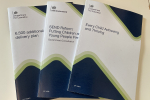
August may be peak month for holidays, but for schools and colleges it also means results for A Levels, GCSEs, BTECs and more. And for hundreds of thousands of students, September is then a time of new beginnings at college, university, or in employment.
It was great to see such strong results locally, and the pictures on social media of excited young people with their envelopes on results day. Congratulations to all, at the culmination of years of study.
Education is also set to be a key subject once again in the new ‘term’ at Westminster.
The last big review of the school curriculum was 2013. It sought to learn from the top-performing places around the world – such as ‘maths mastery’ from Singapore. Although new elements were added to the National Curriculum (such as climate change, and computer coding from a younger age), it remained quite a broad framework.
Those changes went hand-in-hand with a principle of school autonomy, and a huge expansion of the number of schools becoming academies or joining academy trusts. Locally to us, most secondary schools, and a significant number of primaries, are now academies.
The combination of reforms, with the immense dedication of school leaders and teachers, saw a great rise in England’s results compared to other countries. I say England specifically, because Scotland and Wales, which did not have the reforms, did not see those same improvements.
There is now a new review of the curriculum. I recently ‘guested’ back on the Education Select Committee, more than a decade after I was last a member of it, for the evidence session with the leader of the review. She reassured us that the plan was to build on what works well rather than wholesale change. Nevertheless, there will be much scrutiny of the plans, and the workload implications for schools.
More worrying is the new government’s approach to academy and trust freedoms. The Bill on this is currently in the House of Lords, following the scrutiny we gave it in the Commons, with many questions raised. I do hope the government will row back on some of the riskiest aspects.
There is also a major review coming on provision for children with special educational needs and disabilities. Most agree that reform is needed but understandably there are concerns about what form this may take. We will have to assess very thoroughly what ministers bring forward.
Then there is the question of funding. As I’ve written before in this column, falling overall pupil numbers (though the picture varies a lot by locale, depending on aspects such as new housing development) pose a particular issue for small rural primaries, of which in East Hampshire we have many. I have proposed that the formula should change.
All in all, it will be a busy time in the world of education.
As we start the new term, I wish the very best to all pupils and students, especially those starting a new phase of education. And it is a good time to reiterate our thanks and appreciation to their teachers for the brilliant work they do. There is no job quite like it.


